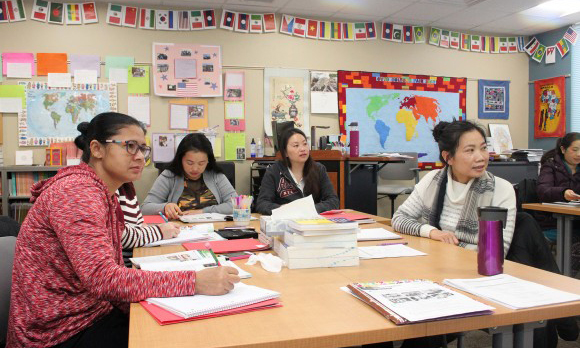Adult Education & English Language Learning
Adult Education programs support learners in building skills for success in college programs and employment, earning a high school credential, and learning English. Over 30,000 learners are supported through Wisconsin Adult Education programs each year. These programs enhance economic mobility among learners and benefit the community and workforce.
A major support for WTCS Adult Education programming is federal Adult Education and Family Literacy Act (AEFLA) funding, which prepares adult learners to:
- Successfully enter and succeed in postsecondary certificate, technical degree or diploma programs, apprenticeship training, associates degree, transfer and/or other postsecondary education
- Attain and retain meaningful and sustainable employment
- Effectively support literacy development and academic success within the family
- Become informed and productive participants in community and civic life
- Become self-directed and lifelong learners
Wisconsin AEFLA 2023-24 Outcomes Summary
Adult Education includes several categories of adult learning, including:
- Adult Foundational Education which spans grades K – 8.9 instruction with grade levels equivalent to academic courses offered by an accredited school district in the state and that build toward the equivalent of high school enrollment.
- Adult Secondary Education which includes 9.0 – 12.9 instruction with grade levels equivalent to academic courses and acceptable for credit toward high school completion approved by the Wisconsin Department of Public Instruction (DPI). ASE includes courses that are designed to prepare learners in pursuit of a GED or high school equivalency diploma (HSED) as well as prepares students for transition and success in postsecondary education. Use Aid Code 76 for Adult Secondary Education, Aid Code 77 for Developmental Education, and Aid Code 78 for Remedial Education.
- For more information contact Christina Lorge, Associate Vice President of Student Success, christina.lorge@wtcsystem.edu
- English Language Learning (ELL) refers to instructional programs designed to assist eligible adults who are English language learners achieve competence in reading , writing, speaking, and comprehension of the English language learners, and leads to attainment of a secondary school diploma or its equivalency, as well as transition to postsecondary education and training or employment. English language learning prepares students for success as community members, parents, and employees.
- For more information contact Cristina Parente, Director cristina.parente@wtcsystem.edu
- To be added or taken off the ELL Faculty Listserv, complete this survey.
- Justice-Involved Education can include components of Adult Education, ELL and/or occupational skills education and training, and is often delivered in partnership between colleges, state and local correctional institutions, and other community partners. The goal of this programming is to reduce recidivism and increase employment for justice-involved individuals.
- For more information contact Lenard Simpson, Director lenard.simpson@wtcsystem.edu
WI State Director of Adult Education & Literacy Services – Christina Lorge, christina.lorge@wtcsystem.edu
AEFLA Grant information can be found on the AEFLA Grant Page.
New NRS Assessments
- NRS Assessment Transition Guide
- NRS Assessment FAQs Updates 3.25.25 Please send questions about the new NRS assessments to cristina.parente@wtcsystem.edu. New questions will be posted weekly.
- Updates Aug 2024 – Test Benchmarks for NRS Educational Functioning Levels
- Federal Register: Tests Determined to Be Suitable for Use in the National Reporting System for Adult Education
- New Educational Level Descriptors- ESL
- Feb. 28th, TABE CLAS- E Forms C & D Training Recording
Ability to Benefit
Ability to Benefit (ATB) is a financial aid provision which offers adult education students the opportunity to enter a WTCS career pathway program, earn a high school credential or its equivalent, and obtain funding for applicable tuition/fees under Title IV federal aid. Ability to Benefit is accessible for students of all backgrounds, abilities, and socioeconomic levels, and is especially beneficial for low income and first-generation college students. For more information about ATB and strategies for implementation, please view the WTCS Ability to Benefit User Guide.
ATB has three eligibility options:
- The student receives a passing score on one of the Department of Education approved ATB tests. In Wisconsin, the ACCUPLACER is commonly used for determining ATB eligibility.
- The student completes at least six credit hours or 225 clock hours that are applicable toward a Title IV-eligible degree or certificate offered by the postsecondary institution.
- The student completes Wisconsin’s State-defined process approved by the Secretary of Education. The WTCS has received approval from the Department of Education for the Wisconsin State-defined process through April 20, 2028.
- All institutions participating in the WTCS Ability to Benefit State Process must sign an MOU of participation and agree to provide all required services. Furthermore, the participating college(s) agree to provide ATB eligible career pathway programs. Please view the WTCS Ability to Benefit State Process FAQ for additional information.

